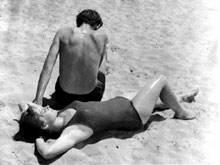By situating the film
simultaneously in the pre and postwar years, the director creates a sense of
doom. This might otherwise have been a lighthearted film about three young
friends, two Russian and one Jewish, who prepare to depart to
military-officer training institutes. Enticed by the complimentary and
inspiring words of the party, which insists that specifically they are
necessary in the fight for democracy and a Communist future, the boys' revel
in proud anticipation. Conversely, their parents offer the voice of adult
reason: if they go, they may never come back. The entire film—itself an
extended flashback—is constructed on such oppositions.
Set in a small southern city located on the sea, the opposition between
developed (artificial) and natural landscapes parallels the boys' distinct
personalities: in town they desperately attempt to publicly exert their
not-yet-achieved manliness by smoking their first cigarettes, drinking with
older men, and receiving a professional shave. But in the water, their lanky
bodies and shrill laughter reveal their genuine childlike natures.
Unsurprisingly then, the beach—the buffer zone between two extremes—is the
locale of their confrontations with new and often contradictory emotions.
Visually, images of innocent youth are juxtaposed with documentary news-reels
of the war as well as with verbal text inter-titles reminiscent of silent
films that are spliced into the film in order to clearly articulate the boys'
ill fated futures.
|
Born in 1927, Mikhail (Moisei) Kalik is without doubt
the single most "unrehabilitated" Soviet director. Unlike films by the
two other great auteur filmmakers of the late Soviet period (Andrei
Tarkovskii and Sergei Paradzhanov), Kalik's films have not returned to
Russian screens and still have not been reintegrated into the history of
Russo-Soviet cinema. In 1951 Kalik was arrested while attending classes
at the State Institute for Cinematography, and was condemned to death for
Zionist activities and for plotting to assassinate Stalin. Like tens of
thousands of other Soviet citizens, he was released from the gulag after
the death of Stalin in 1953 and was "rehabilitated" in 1956 as part of
Khrushchev's de-Stalinization campaign.
After his emigration to Israel in 1971, Kalik once again became a
"non-person." All references to him as a director were strictly
prohibited and his films entirely disappeared from the few film theaters
where they had ever been shown.
Selected Director Filmography:
| 1958 | Our Father's Youth
| | 1960 | Lullaby
| | 1961 | Man Follows the Sun
| | 1964 | Goodbye, Boys
| | 1968 | To Love
| | 1969 | Price
| | 1991 | And the Wind Returneth
|
|
